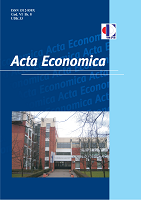РЕПУБЛИКА СРПСКА
REPUBLIC OF SRPSKA
Author(s): Rajko KasagićSubject(s): Supranational / Global Economy, Governance, Economic history, Economic policy, Government/Political systems, International relations/trade, Socio-Economic Research, Wars in Jugoslavia
Published by: Економски факултет Универзитета у Бањој Луци
Keywords: Yugoslavia, constitution; republic; entity; Bosnia-Herzegovina; secession; international community; cooperation;
Summary/Abstract: The constitution of former Socialist Federal Republic of Yugoslavia (SFRY) from 1974 created the legal basis for transferring power from the federal to republic level, and even to the regional one. The elections at the federal level were not in accordance with the Universal Declaration of Human Rights, adopted at the session of the United Nations General Assembly in 1948. The constitutional amendments from 1988 gave the republics the complete authority over foreign policy. It was the last element necessary to create the ground for the republics to secede from SFRY. In addition, the republics were neither politically nor military willing to defend Yugoslavia despite the constitutional norms according to which whoever that did not respect the inalienable right and obligation to defend the integrity and sovereignty of Yugoslavia was considered and treated as a traitor. The final outcome of this unconstitutional disintegration of Yugoslavia were war conflicts and establishment of several ethnic countries, and after that, provoking further conflicts in those newly established countries which, as the Yugoslavian republics, were multinational (Serbia and Montenegro, Macedonia). Gordian knot has not been untied yet; the same stands for BosniaHerzegovina, the country consisting of two entities and three constitutional nations, although Bosnia-Herzegovina is being gradually directed towards the division into cantons, which was the part of Cutillero’s plan accepted by the Serbian representatives in 1992, a few months before the civil war broke out. It should be added that newly established multinational countries exist under the political protectorate of the United Nations, which is slightly more liberal in Kosovo and Bosnia-Herzegovina, where one person is appointed as a protector by the Security Council.
Journal: Acta Economica
- Issue Year: 4/2006
- Issue No: 4
- Page Range: 9-28
- Page Count: 20
- Language: Bosnian, Croatian, Serbian

